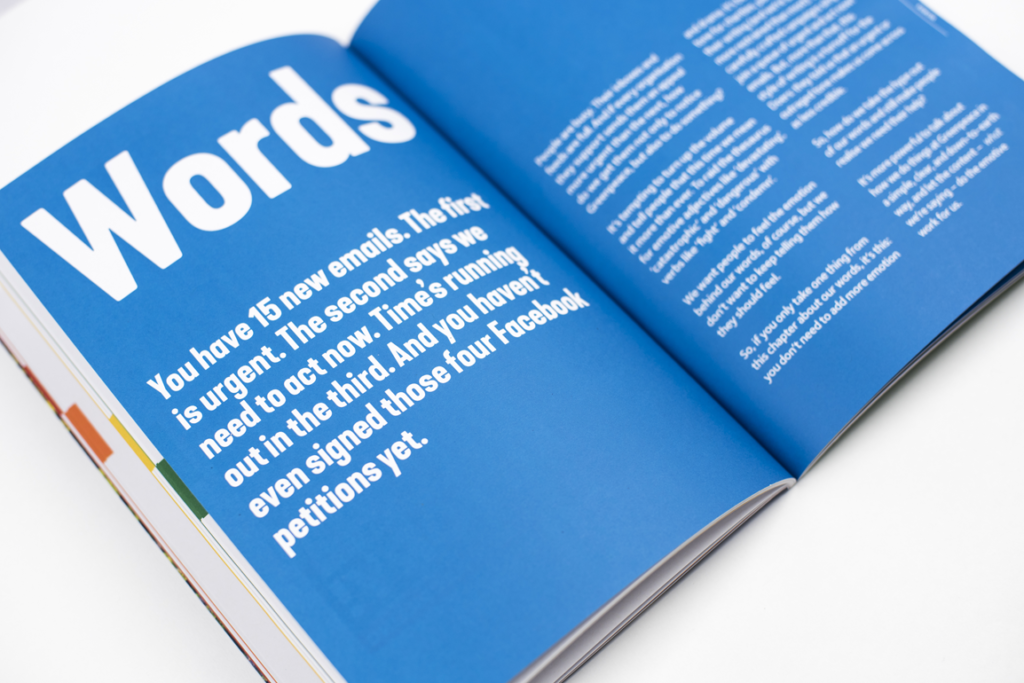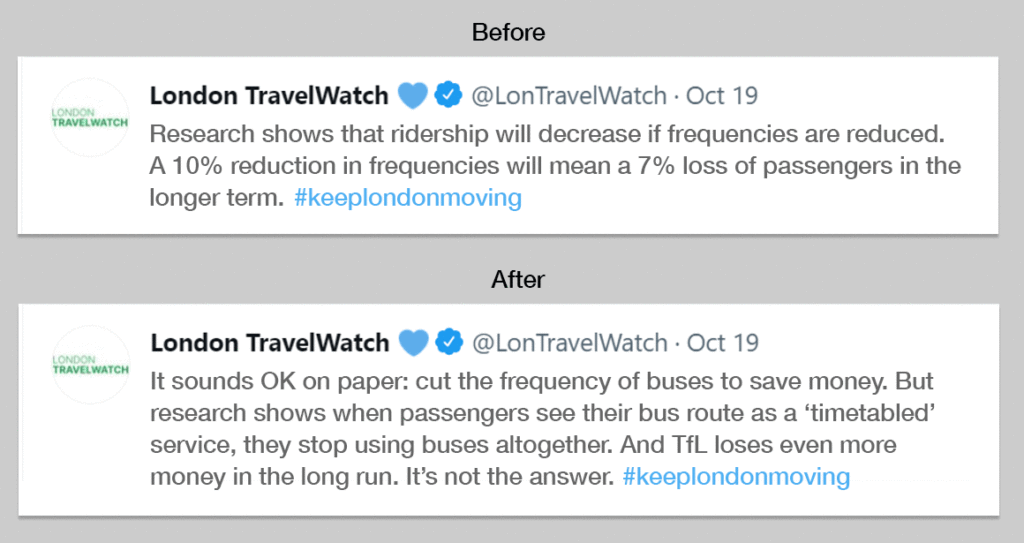WHAT DO WE WANT? JUSTICE AND A SYSTEM-WIDE TRANSFORMATION IN OUR ECONOMY THAT EMPOWERS CITIZENS AS EFFECTIVE STEWARDS OF OUR FUTURE THROUGH CIRCULAR PRODUCTION, CONSUMPTION AND INVESTMENT PRACTICES, AND MANY OTHER CRITICAL SOLUTIONS.WHEN DO WE WANT IT?NOW! Were going...
WHAT DO WE WANT?
JUSTICE
AND A SYSTEM-WIDE TRANSFORMATION IN OUR ECONOMY THAT EMPOWERS CITIZENS AS EFFECTIVE STEWARDS OF OUR FUTURE THROUGH CIRCULAR PRODUCTION, CONSUMPTION AND INVESTMENT PRACTICES, AND MANY OTHER CRITICAL SOLUTIONS.
WHEN DO WE WANT IT?
NOW!
Were going to need a bigger placard.
It used to be easy to write pithy, punchy slogans for an NGO (non-governmental organisation) or charity. Cancer Research stops cancer, Amnesty stands up for human rights, Greenpeace protects the environment. Now? Erm Its getting harder to pick apart which NGO/charity does what, or to sum up their work in a page or two, let alone a sentence.
Take UNICEF, the United Nations Childrens charity. They write: the climate crisis is a childs rights crisis. And theyre not wrong: climate change affects everyone and everything, and causes poverty and homelessness among many other problems. But one NGO easily blurs with the next if everythings presented around climate change alone. Then there are the thorny issues of identity and post-colonial guilt that come from most NGOs being unevenly concentrated in one half of the planet. Throw in lots of high-minded academic concepts and mangled bits of brand strategy and what have you got? A big knot. Its not surprising everyones a bit lost.
Recently, weve been helping a bunch of NGOs untie the knots by writing about what they do with some well-chosen, non-NGO-sounding words. A lot of the issues we came across were similar. So put that vision, theory of change, ambition statement, key messages and those brand pillars to one side for a moment, and well take you through some of the things we learned.
Nice to meet you, NGO. What do you do again?
1. LOFTY AIMS ARE TOO ABSTRACT TO BE USEFUL
Its hard to whittle down what your NGO does to three or four things, let alone one. And yes, in theory, one way to do this is to simply sweep everything you do under a big concept like tackling inequality, or an academic theory like rights-based education. But when theyre that open ended, it becomes hard to know where your organisations work starts and stops, versus 90% of other NGOs who are tackling those things too. For these projects, we nearly always have to go back to basics and split apart what an NGO actually does (the bit that gets glossed over in ambition statements) from how it does them. And, most of all, we have to unpick everything and write the words long hand. If you distill things too soon (see step nine), youll get stuck in a long-running debate about justice vs legitmacy for the rest of your five-year strategy, while no-one will quite remember the point you were actually trying to make.
2. TONE DOWN THE DRAMA
When we worked for Greenpeace, we found supporters responded better to emails and petitions when we cut the alarmist language (eg grave risk, decimated and so on). You dont need to cast oil companies or big tech as villains. It sounds counter-intuitive, but losing the drama makes the writing more hard-hitting. The plain facts and scale of the problems are stark enough, so toning down not dumbing down the language helps people focus on what we can all do to fix things.
 GREENPEACE: words have more punch without the URGENT! ACT NOW! hyperbole.
GREENPEACE: words have more punch without the URGENT! ACT NOW! hyperbole.
3. CUT TO THE CHASE
No-one wants a three-page summary of the immense problems society faces, but we do want to know what your organisation is doing about them and where/how it fits. Keep your words pithy and headline-y, and make sure your pitch is front and centre. Snappily set out what you do overall at the start. And its a good discipline to organise everything you write around what youre doing to make things better.
4. CONCENTRATE ON THE THINGS YOU CAN DIRECTLY CHANGE
Be specific: write about how you plan to change things rather than just presenting the problem or setting out some wishy-washy aims around it. Even protest movements like XR and Stop Oil need a what next? plan for what happens if (and when) their demands arent met. The classic case study here is Occupy, which ran out of steam because it couldnt pin down what it was going to do next. Thats not to say you cant have big ambitions or be part of a bigger picture like Net Zero but if your NGO seeks a more practical answer than outrage, at some point youll need to concentrate on specifics and your role in making them happen.
5. SINGLE OUT EXAMPLES OF WHAT YOURE DOING OR HAVE DONE
Sometimes its tricky to pin down or measure the impact of things and your part in making them happen. Thats OK if youre clear and dont fudge it or bundle everything under broad words like advocacy, which every NGO talks about. Be clear about what you did or what you were setting out to change (eg lobbying meetings about x behind the scenes, or drawing attention to biased algorithms), then be clear about where youve got to or where you want to get to. And if its hard to get there, clearly explain why.
6. LESS NGO-Y AND WONKISH
If you write about complex things using clear words, your writing wont sound dumbed down. Itll sound smart. Even a clued-up, policy-writing consultant would find it easier to read Well put people whose lives are most affected by climate change first or the snappier Climate change isnt fair, than elevating the needs and demands of those disproportionately affected by climate change. And write about strategic stuff more directly, ie instead of four pillars write something like here are four ways well do this (or whatever makes sense).
 LONDON TRAVELWATCH: We've been helping them write less like a policy think tank and more as a passenger champion (which is what they're set up to be). Which means cutting words like "ridership" and spelling out what policy changes mean for a Londoner's daily commute.
LONDON TRAVELWATCH: We've been helping them write less like a policy think tank and more as a passenger champion (which is what they're set up to be). Which means cutting words like "ridership" and spelling out what policy changes mean for a Londoner's daily commute.
7. DONT NAME EVERYTHING!
One NGO we spoke to was tripping over so many labels, like the fair and just corridor, and names of the partners they were working with (eg the Future Change Lab), we couldnt work out how everything fitted together. So, first off, sum up what you do without any names. Then decide where and how each part fits with the whole, and whether they even need a name. It sounds like a political nightmare on paper, but it works if you manage it. We got everyone in Amnesty Tech to sign up to the principle before we started working with them. It made things MUCH easier (for everyone!) and diffused any internal misunderstandings from the off. Finally, if you do name different teams/areas of work, ditch stodgy words like accountability and dont copy everyone else (Labs are very popular now these things come in waves).
8. UNPACK AND EXPLAIN
As well as names, there are lots of NGO phrases and buzzwords like accelerate the power shift, driving change and everything is intersectional these days. These phrases make writing stodgy and your organisations take gets lost. Writing about how youll make things happen longhand may well need more words or even a couple of sentences, but it will help people understand what youre up against and what youre doing about it.
WE LIKE, CLICK AND TICK WITHOUT QUESTIONING WHO WE'RE HANDING OUR DATA TO - AND WHY. That was our 'hook' or way in to write about Amnesty Tech's work, introduced here by Rasha Abdul-Rahim, director of Amnesty Tech.
9. AND ONLY WHEN YOUVE DONE ALL THAT, CAN YOU MAKE YOUR PITCH CATCHY.
When we started working for Amnesty, their vision read like an essay and ran over a dozen prosaic pages. By the end, we had a snappy articulation (which helps them talk about what they do in everything from internal presentations to job ads). Weve nearly finished a similar project for Global Witness. But you can only get to that point if you put in the work and unpack the details: what fits, what doesnt and how does it all come together? A lot of the reason branding exercises can feel like theyre going round in circles is they stay too high level and abstract. Its easy to debate whether you need to include an adjective in a brand value but lose sight of the main things you want to start doing!
10. GET SOMEONE TO OWN THE DRAFTS
Another reason NGO and charity stuff is so hard to manage is that most organisations have flat hierarchies and there are a lot of views and competing priorities. Which is why one person needs to own the words and make a call. But we usually find that the process of working through what to say (and how) highlights repetition and shows how to make your pitch tighter. When the writings sharp and the thinkings clear and pinned down, it does more than set direction or improve comms. It brings internal unity and irons out any disagreements too.
The post It's hard to tell one NGO from the next appeared first on We All Need Words.


